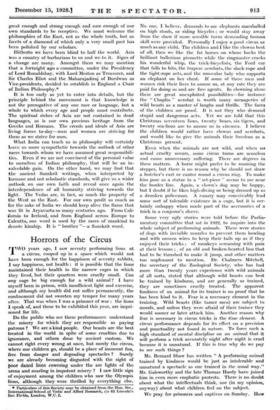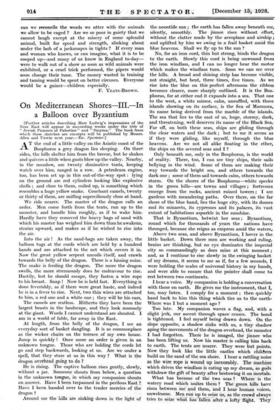Horrors of the Circus
TWO years ago, I saw seventy performing lions at a circus, cooped up in a space which would not have been enough for the happiness of seventy rabbits. I say happiness, not health : it is possible that the lions maintained their health in . the narrow cages in which they lived, but their quarters were cruelly small. Can any cage be big enough for a wild animal ? I have myself been in prison, with insufficient light and exercise, and although my health did not suffer permanently, the confinement did not sweeten my temper for many years after. That was when I was a prisoner of war : the lions I speak of, and those to be exhibited this year, are impri- soned for life.
Do the public who see these performances understand the misery for which they are responsible as paying patrons ? We are a kind people. Our beasts are the best treated in the world in spite of some cruelties due to ignorance, and others done by ancient custom. We cannot right every wrong at once, but surely the circus, where our children go, should be a place of innocent fun, free from danger and degrading spectacles ? Surely we are already becoming disgusted with the sight of poor dazed lions cowering under the are lights of the arena and snarling in impotent misery ? I saw little sign of enjoyment among the children who saw the Olympia lions, although they were thrilled by everything else.
• • Particulars of this Society may be obtained from the Hon. Sec., International School of Vedic and Allied Research, clo 63 Lincoln's Inn Fields, London, W.C. 2. No one, I believe, demands to see elephants marshalled on high stools, or riding bicycles ; or would stay away from the show if more sensible turns demanding human skill, were provided. Personally I enjoy a good circus as much as any.child. The children and I like the clowns best of all, then we like the fat horses on whose backs the brilliant ballerinas pirouette while the ringmaster cracks his wonderful whip, the trick-bicyclists, the Ford car that falls to bits, the trapeze acrobats, the slack-rope and the tight-rope acts, and the muscular lady who supports an elephant on her chest. If some of these men and women risk their lives to amuse us, at any rate they are paid for doing so and are free agents. In clowning alone there are great unexploited possibilities—for instance the " Chaplin " acrobat is worth many menageries of wild beasts as a master of laughs and thrills. The faces of the children are proof. It is not they who demand stupid and dangerous acts. Yet we are told that this Christmas seventeen lions, twenty bears, six tigers, and twenty sea-lions are to amuse us in circuses. I believe the children would rather have clowns and acrobats, and would like to give the animals their freedom as a Christmas present.
Even when the animals are not wild, and when no actual cruelty occurs, some circus turns are senseless and cause unnecessary suffering. There are degrees in these matters. A horse might prefer to be roaming the steppes, but there is no reason why he should not draw a butcher's cart or canter round a circus ring. To make him pose as a statue in a " set-piece " seems to me near the border line. Again, a clown's dog may be happy, but I doubt if he likes high-diving or being dressed up as a drunken policeman. A canary may conceivably lead some sort of tolerable existence in a cage, but it is cer- tainly unhappy when made part of the accessories. of a trick in a conjuror's sleeve.
Some very ugly stories were told before the Parlia- mentary committee that sat in 1922, to inquire into the whole subject of performing animals. There were stories of dogs with invisible muzzles to prevent them howling and with unseen wires to keep their tails up as if they enjoyed their tricks ; of monkeys screaming with pain at their lessons ; of an old and broken-hearted lion that had to be thrashed to make it jump, and other matters too unpleasant to mention. Dr. Chalmers Mitchell, the secretary of the Zoological Society, who has had more than twenty years experience with wild animals of all sorts, stated that although wild beasts can best be trained by kindness, and are generally so trained, they are sometimes cruelly treated. The apparent fondness of an animal for its trainer is no proof that he has been kind to it. Fear is a necessary element in the training. Wild beasts (like tamer men) are subject to moods, and unless they were afraid of their trainer they would sooner or later attack him. Another reason why fear is necessary in circus tricks is the time element. A circus performance depends for its effect on a precision and punctuality not found in nature. To force such a high standard of mental discipline on an animal that it will perform a trick accurately night after night is cruel because it is unnatural. If this is true why do we pay to see such things ?
Mr. Bernard Shaw has written " A performing animal trained by kindness would be just as intolerable and unnatural a spectacle as one trained in the usual way." Mr. Galsworthy and the late Thomas Hardy have joined him in even more emphatic protests. There is no doubt about what the intellectuals think, nor (in my opinion, anyway) about what children feel on the subject.
We pray for prisoners and captives on Sunday. How can we reconcile the words we utter with the •animals we allow to be caged ?• Are we so poor in gaiety that we cannot laugh except at the misery of some splendid animal, built for speed and strength, slinking about under the lash of a jackanapes in tights ? If every man and woman who knows, or can imagine, what it is to be cooped up—and many of us know in England to-day- were to walk out of a show as soon as wild animals were exhibited, or a cruel trick performed, the pipers would soon change their tune. The money wasted in training and taming would be spent on better circuses. Everyone would be a gainer—children especially.
F. YEATS-BROWN.









































 Previous page
Previous page